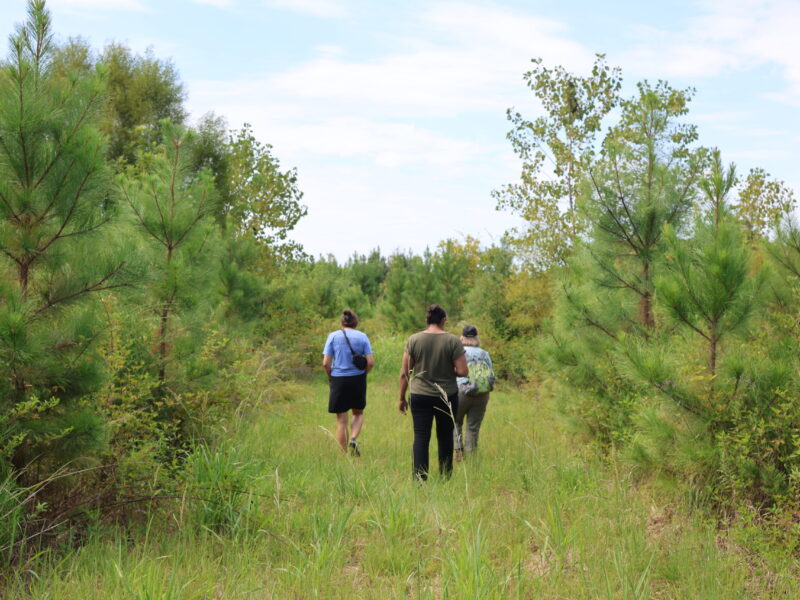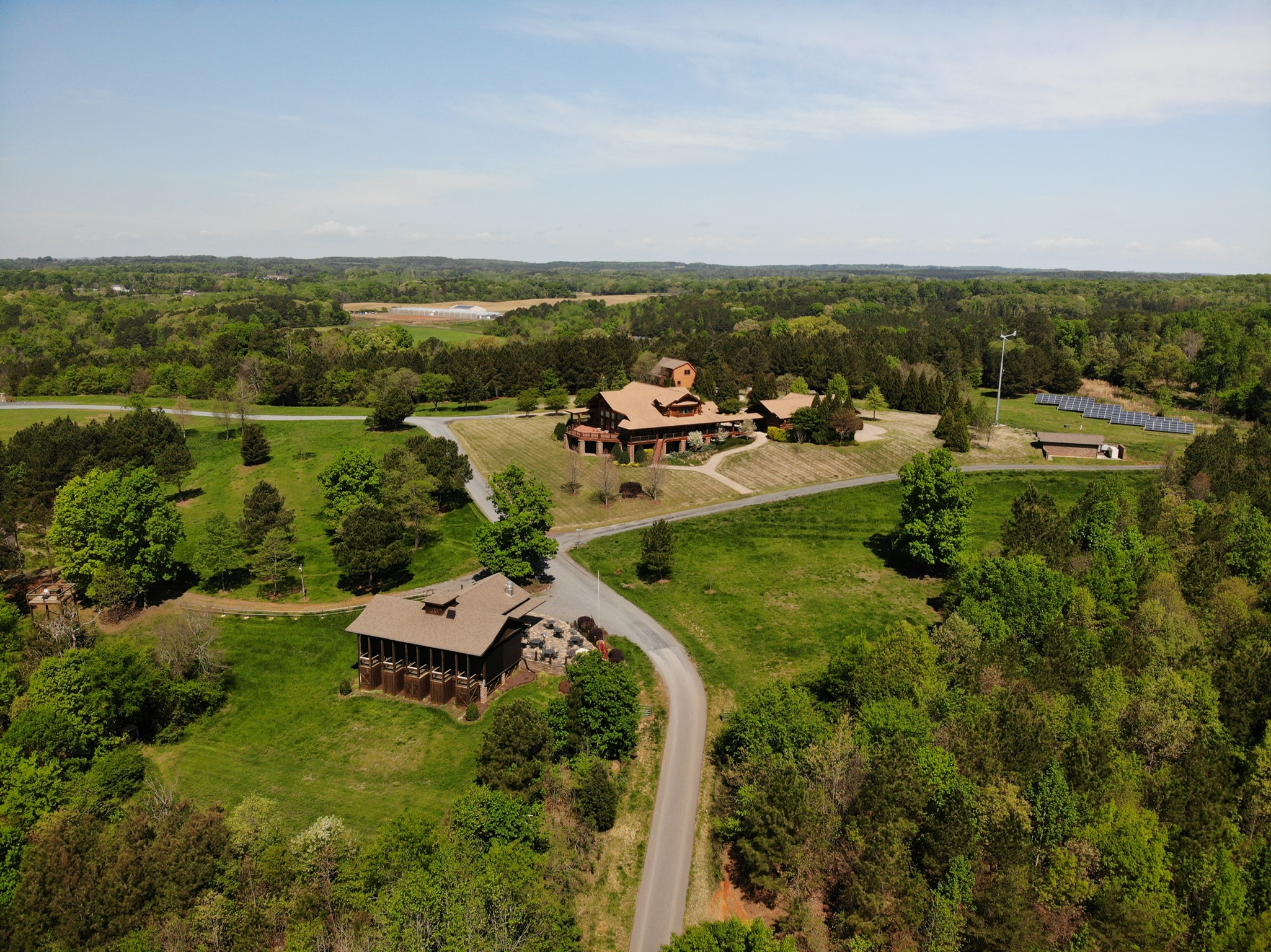
Changing the Way the World Grows
Moving from Sustainability to Regenerative Agriculture at Juneberry Ridge
Part retreat, part conference center, part weekend getaway, part farm, part agritourism destination and part mission to prove the concept of regenerative farming – Juneberry Ridge is hard to describe because there’s no one way to describe it. And that’s not even mentioning the tilapia, trout and clay shooting.
Owned by former National Welders Supply Company Chairwoman Judy Carpenter, Juneberry Ridge is a simple idea that became a mission to change the world – a weekend retreat that has evolved into a lifetime passion project for all involved. At its heart is the juneberry, a tart blueberry-like fruit found on a tree known for its resilience and ever-changing appearance – the perfect metaphor for a picturesque retreat that is constantly evolving.
Located on 750 acres in tiny Norwood, N.C. – about an hour east of Charlotte in Stanly County, within Foundation For The Carolinas’ 13-county regional footprint – Juneberry Ridge is surrounded by rolling hills that disappear behind lush trees and endless horizons. The property is abundant with walking trails, perfect for visitors looking to explore the nature around them. Which is exactly the point.
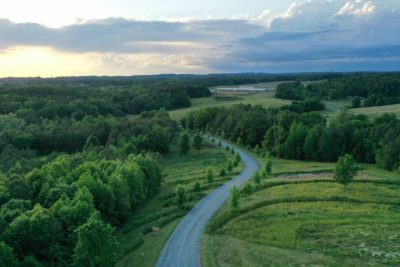
Juneberry Ridge is located on 600 acres in Norwood, NC.
“With the National Park or State Park, you’re not supposed to go off trail, you’re not supposed to touch, you’re not supposed to taste, you’re not supposed to take,” said Ross Lackey, the farm’s lead designer. “That’s why we want visitors to have the full experience at Juneberry Ridge. We want them to go off trail. We want you to pick that wild blueberry growing on the hillside. Our landscaping is edible and medicinal, right outside the cabin. You know, there’s figs over there. They’re now ripe. We want people to touch and to feel and to smell.”
Sharing the space are five rentable cabins with modern amenities such as AC, Wi-Fi, TV. All the cabins are named after a different tree on the property – Acorn, Chestnut, Fig, etc. There are also larger cabins for rent, sleeping as many as eight, and other facilities ideal for large groups, conferences, weddings or weekend getaways, such as the Lakeview conference center or the spacious Main Cabin. There are basketball and tennis courts, an entertainment room with a pool table and a world-class clay pigeon shooting range – a passion of Carpenter’s.
But the star is the land itself.
“Invariably, even if you think you just want to rent a cabin so you can get away for a day or a week, you’re going to find yourself walking around and stopping to see the sheep or the goats or wanting to get closer to some of the gardens or the orchards, where things are ripening,” said Donna Elyea, Juneberry Ridge’s controller.
At Juneberry Ridge’s heart is a vision of a more ecologically responsible future. What started as a project for Carpenter has been embraced by a loyal staff dedicated to carrying her idea further than she ever originally intended. They really do want to change the world by proving that regenerative farming is not an oxymoron.
EYE ON THE TARGET
As Juneberry Ridge’s website tells it, the retreat began with a challenge: “When Judy Carpenter first bought the land that became Juneberry Ridge, it was because she had been told she couldn’t do something – that as a woman, despite being a champion, she should find her own place to do competitive clay target shooting. So, she did.”
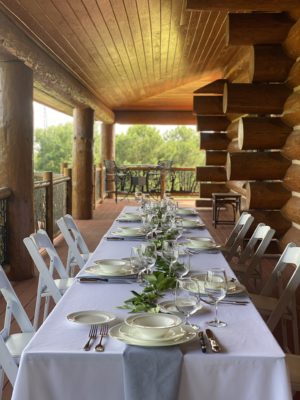
With a chef on staff, Juneberry Ridge makes “farm-to-table” easy for visitors.
A contractor working on her house in Tega Cay, S.C., told her about some property in Norwood – 79 acres (at the time), remote enough to be perfect for target shooting. She started by building a little house for weekend stays, beside a trap field and a Five Stand shooting range. Next came the main house, completed around 2013. Then came the conference center.
With so much work being done and friends visiting, she wanted to grow her own food to help feed her expanding community. The employees helping to build up the property – then known as Lucky Clays Farm on account of Carpenter’s passion for target shooting – had ideas of their own, more sustainable ways to farm, construct, live – all focused on shrinking the farm’s footprint. The history of Juneberry Ridge is highlighted with employees having a good idea and Carpenter encouraging them to pursue it.
“Very quickly, the farm became a place to experiment with ways that were less harmful to the planet,” said Suzanne Durkee, Juneberry Ridge’s CEO. “Thus, the LEED-certified home that (Judy) built with the Main Cabin, the 8,000-gallon cistern that collects water off the roof to be used for watering plants around her immediate property, the wind turbine that you see in her backyard and the solar panels.”
The farm started creating a name for itself by selling microgreens and other produce to local chefs. The team explored how to grow more types of food sustainably through aquaponics, a farming method that combines hydroponics (growing plants without soil) with aquaculture (growing fish). This type of farming uses energy, water and growing spaces more efficiently. A state-of-the-art, 40,000-square-foot facility on the property was built to raise everything from tilapia to bibb lettuce.
“It was just word of mouth advertising through the chef network,” said Brian Hinson, the farm manager, about the early days. “We had customers call and ask us if we could supply them. Our small initial greenhouse could only handle about 12 restaurants. We were having all these customers calling who we were turning away. That was part of the initiative to upscale and upsize and start that big set of greenhouses.”
Judy and her Juneberry gang had even more plans – turning the space into a retreat and conference center and tapping into the burgeoning agritourism market, for instance. Each idea was in service to helping fulfill their mission: “Change the way the world grows.” Why just tell people about the impact you are having on the environment when you can show and, hopefully, inspire?
To add structure to all these various threads and develop a comprehensive business plan, Carpenter brought on Durkee as CEO in 2016.
“She had a number of really smart employees that were eager but didn’t necessarily have any experience with starting a business,” Durkee said. “It was pretty clear from the start that the employees really had some good ideas. They just didn’t know how far they could take them.”
That business plan led to the rebranding as Juneberry Ridge – taking the name from the fruit so prominent around the property. The new name united several ideas under one banner.
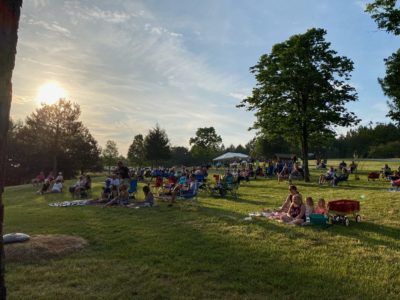
Juneberry Ridge holds concerts on property, inviting the local community.
But regardless of the name, one consistent thread throughout the farm’s history has been a staff of smart, passionate experts in their field who care about what the farm stands for. At a team retreat, staff began thinking beyond sustainable farming (meaning, you only take out of the environment what you put back into it) to regenerative agriculture (adding more to the environment than you take out). It is Juneberry Ridge’s goal to prove what they’re doing works. And inviting more guests to the property to attend outdoor concerts, hold meetings, weddings, weekend getaways and anniversary dinners is a way of spreading the message beyond the farm’s 600 acres.
“It’s not about just doing it here at Juneberry,” said Durkee. “Judy wants to leave a legacy. She wants to leave this Earth better than it was when she arrived. So, the group learned very quickly that our objective had to be to prove to not only ourselves but to others that regenerative agriculture is actually a profitable business model.”
A WALK IN THE WOODS
An important component of spreading the message of Juneberry Ridge is being accessible to neighbors in Norwood and throughout Stanly County. Connecting with the community was one of the reasons the team established a field of interest fund at Foundation For The Carolinas, through which Juneberry employees fund local nonprofits aligned with their mission of creating more sustainable farming practices and providing pathways to educational opportunities in agriculture.
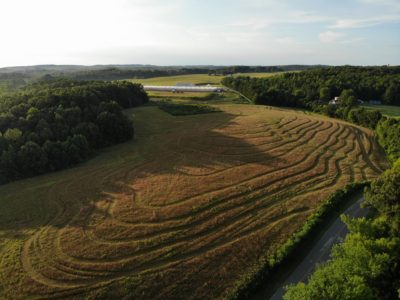
The working farm offers various tours for visitors, including walking and foraging tours.
FFTC Field of Interest Funds are typically established to support a particular issue or geographic region and allow the donor to outsource grantmaking to Foundation For The Carolinas or a committee with expertise, as is the case here. “Judy’s input has been that she wants the fund to be for the benefit of this local community, meaning the town, county and neighboring counties,” Elyea, the controller, said.
Visitors from anywhere, of course, are always welcome at the farm. They’ve seen groups as diverse as Fortune 500 executive retreats, life coaches bringing students for sessions and church groups holding board meetings. With an on-staff chef – and always fresh produce, eggs and meat, of course – they offer catered meals of all budgets and menu choices.
They also offer various farm, greenhouse or foraging tours and hands-on workshops, plus a variety of hiking trails, guided hikes and a well-stocked fishing pond with bass, catfish and more. Bikes are available for the adventurous. Goat, sheep, cows and chickens are scattered around the property if you want to go exploring. And in spring 2021, they planted nearly 4,000 fruit and nut trees.
That’s good news for repeat visitors: The farm is ever-evolving. But while Juneberry Ridge is hard to describe because there’s so much to it, there’s one phrase they’re definitely not interested in.
“We, the employees, had the desire for Juneberry Ridge to not be ‘a hidden gem,’” Hinson said. “Judy was on board. Let’s take that ‘hidden’ away. Let’s really be an asset to the community here and be friends and neighbors, too. And, so with that, we have to get people out here to experience it.”
Visit Juneberry.com for more information.


